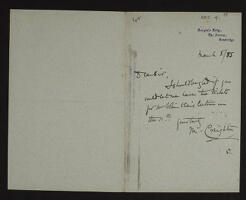Informs Sidgwick that the holidays have given him time to read the E[ncyclopedia Britannica?], which he had sent to him. Remarks that his analysis of 'Public Morality' 'clears up several matters'. Discusses the principles on which a historian ought to judge the actions of a statesman, claims that Acton 'does not face the difference...between the principles on which a statesman may act and those aforementioned historian's principles', and warns against the critic introducing his own presuppositions. Remarks that Sidgwick had not touched on the moral influence on the historian's generation of a public war, and uses Bismarck to illustrate his point. Agrees with Sidgwick about 'clerical veracity', and remarks that it is 'curious how the moral sense of the community has practically ruled out Rashdall's view.' States that he is enjoying 'this place' very much.
Thanks him for sending [Roden] Noel's poems. Reports that Arthur has [James Russell?] Lowell's new volume and likes it very much. Claims that the amount of writing she had to do that term has prevented her from doing very much reading. Reports that she has not been able to do much about Fred Horton and his education, and that at present he is attempting some old Scholarship Examination papers, which she sent to him. Mentions St John's Foundation School at Clapton, and what Edward has told her about it.
Informs Henry that Arthur wishes him to know he will not now go abroad at Easter, as [Fred] Myers has taken ill and cannot go. Arthur thinks that he will go away as soon as he can. States that she will be very glad to see Henry either on 18 or 21 March, and Trevelyan if he comes any time between 18 and 25 March. Expects Edward, Minnie and their two eldest boys on 25 March, and states that Edward wants to go to Cambridge to finish some book that he is bringing out. Minnie is to stay in Rugby until he takes her to pay a visit to the Bishop of Hereford.
Regrets to hear that Henry has been suffering from strained nerves and sleeplessness, and suggests that he take a holiday. Admits to being a little worried about William because of his lack of correspondence since 29 January, and that she hears from Mr [Mandell?] Creighton that he has written to no Oxford friend since he left. Refers to Minnie's domestic problems. Asks to be remembered to Mrs Kingsley [?], and reports that Miss Temple has been very ill.
Sin títuloAnnounces his return [from accompanying his sister Minnie to Wiesbaden], having read all of Myers' books. Claims to be very glad to have 'attained s[ ] views on Paul de Kock'. Asks Myers if he knows what other of his works are worth reading, and states that he quite understands Disraeli's praise of him, and sees his influence on 'D.' a little. Remarks that Taine is 'a clever man', but does not like his work. Reports that the Venns have just returned, but that he hasn't seen them.
Asks Myers if he thinks that [Mandell?] Creighton and Laing would correspond with women [as part of an educational correspondence programme] in English literature. Discusses the need for more money to subsidise 'impecunious governesses', and asks him if he thinks any wealthy person sympathetic to the project would subscribe. The plan is to 'make the poor girls pay for one course, and then give them two more if they like'; a 'certificate of poverty from a clergyman' is always obtained. Refers briefly to the troubles at Rugby [with Henry Hayman].
Refers to her 'nice long letter', which he received two weeks previously, and sends on the thanks of Maggie and Frances [his wife and daughter] for all Nora's good wishes and for the pleasure her letter gave them. Hopes that she is well, and remarks that from her description of her life it seems to him that she is comfortable. Remarks also on the 'solemn and momentous incidents' that have occurred since she wrote to him, including [the deaths of] Creighton, Frederick Myers and the Queen. Adds that they all agree that her brother [Arthur Balfour]'s words 'were the noblest of all' [in relation to the Queen's death.]
Says that he is going to get a new map of Egypt [where Nora is travelling?], so that they 'may sit on that high place and see those sunsets - and the line of the mighty river and the E[ ] plain and the distant mountains.' States that he is also going soon to Oxford when Arthur [Sidgwick] 'has settled down and is ready' for him; wishes that 'something [could] be done to release [Arthur] from some of his work'. Wishes he knew what Henry would have advised him to do. Refers to the explanatory note on the numbers of Henry's letters, which he sends on a separate page [included].
Sin títuloReports that she has just heard the news about Henry Sidgwick's deteriorating health, and felt that she must write to Nora to tell her how they are thinking of her. Prays that she may gain courage and comfort. Remarks that all who ever knew Henry 'must feel how much they owe to the example of his noble life', and feels that she may thank him 'for so many pleasant and stimulating hours of talk.' Asks her to tell him how much they think of him and how grateful they are for his friendship to them in their Cambridge life.
Bishop [Mandell] Creighton's favourite historical periods, use of "temporis acti".
Writes on the subject of awarding degrees to women. Agrees with Sidgwick that 'things are not now as they were in 87'. Takes a fairly neutral stance on the issue, claiming that he would discourage any opposition to the request 'for a syndicate to consider the question'. Expresses concern at the interference of non-residents in University affairs, and discusses the importance of the University's constitution.
